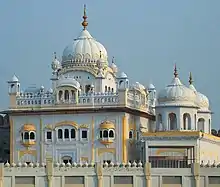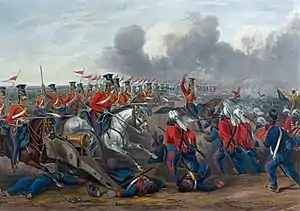|
The Punjab Portal
Introduction_with_cities.png.webp) Punjab map (topographic) with cities Punjab (/pʌnˈdʒɑːb, -ˈdʒæb, ˈpʊn-/; Gurmukhi: ਪੰਜਾਬ; Shahmukhi: پنجاب; Punjabi: [pə̞ɲˈdʒäːb] ⓘ; also romanised as Panjāb or Panj-Āb) is a geopolitical, cultural, and historical region in South Asia. It is specifically located in the northern part of the Indian subcontinent, comprising areas of modern-day eastern-Pakistan and northwestern-India. Punjab's major cities are Lahore, Faisalabad, Rawalpindi, Gujranwala, Multan, Ludhiana, Amritsar, Sialkot, Chandigarh, Shimla, Jalandhar, Patiala, Gurugram, and Bahawalpur. Punjab grew out of the settlements along the five rivers, which served as an important route to the Near East as early as the ancient Indus Valley civilization, dating back to 3000 BCE, and had numerous migrations by the Indo-Aryan peoples. Agriculture has been the major economic feature of the Punjab and has therefore formed the foundation of Punjabi culture, with one's social status being determined by land ownership. The Punjab emerged as an important agricultural region, especially following the Green Revolution during the mid-1960s to the mid-1970s, and has been described as the "breadbasket of both India and Pakistan." Punjab's history is a tapestry of conflict, marked by the rise of indigenous dynasties and empires. Following Alexander the Great's invasion in the 4th century BCE, Chandragupta Maurya allied with Punjabi republics to establish the Maurya Empire. Successive reigns of the Indo-Greek Kingdom, Kushan Empire, and Indo-Scythians followed, but were ultimately defeated by Eastern Punjab Janapadas such as the Yaudheya, Trigarta Kingdom, Audumbaras, Arjunayanas, and Kuninda Kingdom. In the 5th and 6th centuries CE, Punjab faced devastating Hunnic invasions, yet the Vardhana dynasty emerged triumphant, ruling over Northern India. The 8th century CE witnessed the Hindu Shahis rise, known for defeating the Saffarid dynasty and the Samanid Empire. Concurrently, the Tomara dynasty and Katoch Dynasty controlled eastern Punjab, resisting Ghaznavid invasions. Islam took hold in Western Punjab under Ghaznavid rule. The Delhi Sultanate then succeeded the Ghaznavids in which the Tughlaq dynasty and Sayyid dynasty Sultans are described as Punjabi origin. The 15th century saw the emergence of the Langah Sultanate in south Punjab, acclaimed for its victory over the Lodi dynasty. After the Mughal Empire's decline in the 18th century, Punjab experienced a period of anarchy. In 1799 CE, the Sikh Empire established its rule, undertaking conquests into Kashmir and Durrani Empire held territories, shaping the diverse and complex history of Punjab. The boundaries of the region are ill-defined and focus on historical accounts and thus the geographical definition of the term "Punjab" has changed over time. In the 16th century Mughal Empire the Punjab region was divided into three, with the Lahore Subah in the west, the Delhi Subah in the east and the Multan Subah in the south. In British India, until the Partition of India in 1947, the Punjab Province encompassed the present-day Indian states and union territories of Punjab, Haryana, Himachal Pradesh, Chandigarh, and Delhi, and the Pakistani regions of Punjab, and Islamabad Capital Territory. The predominant ethnolinguistic group of the Punjab region are the Punjabi people, who speak the Indo-Aryan Punjabi language. Punjabi Muslims are the majority in West Punjab (Pakistan), while Punjabi Sikhs are the majority in East Punjab (India). Other religious groups include Hinduism, Christianity, Jainism, Zoroastrianism, Buddhism, and Ravidassia. (Full article...) Selected article -The Guru Granth Sahib (Punjabi: ਗੁਰੂ ਗ੍ਰੰਥ ਸਾਹਿਬ, pronounced [ɡʊɾuː ɡɾəntʰᵊ saːhɪb]) is the central holy religious scripture of Sikhism, regarded by Sikhs as the final, sovereign and eternal Guru following the lineage of the ten human gurus of the religion. The Adi Granth (Punjabi: ਆਦਿ ਗ੍ਰੰਥ), its first rendition, was compiled by the fifth guru, Guru Arjan (1564–1606). Its compilation was completed on 29 August 1604 and first installed inside Golden Temple in Amritsar on 1 September 1604. Baba Buddha was appointed the first Granthi of the Golden Temple. Shortly afterwards Guru Hargobind added Ramkali Ki Vaar. Later, Guru Gobind Singh, the tenth Sikh guru, added hymns of Guru Tegh Bahadur to the Adi Granth and affirmed the text as his successor. This second rendition became known as the Guru Granth Sahib and is also sometimes referred to as the Adi Granth. The text consists of 1,430 angs (pages) and 5,894 shabads (line compositions), which are poetically rendered and set to a rhythmic ancient north Indian classical form of music. The bulk of the scripture is divided into 31 main rāgas, with each Granth rāga subdivided according to length and author. The hymns in the scripture are arranged primarily by the rāgas in which they are read. The Guru Granth Sahib is written in the Gurmukhi script in various languages including Punjabi, Lahnda, regional Prakrits, Apabhramsa, Sanskrit, Hindi languages (Braj Bhasha, Bangru, Awadhi, Old Hindi), Bhojpuri, Sindhi, Marathi, Marwari, Bengali, Persian and Arabic. Copies in these languages often have the generic title of Sant Bhasha. (Full article...)General imagesSelected biography -Mohammad Abdus Salam NI(M) SPk (/sæˈlæm/; pronounced [əbd̪ʊs səlaːm]; 29 January 1926 – 21 November 1996) was a Pakistani theoretical physicist. He shared the 1979 Nobel Prize in Physics with Sheldon Glashow and Steven Weinberg for his contribution to the electroweak unification theory. He was the first Pakistani and the first Muslim from an Islamic country to receive a Nobel Prize in science and the second from an Islamic country to receive any Nobel Prize, after Anwar Sadat of Egypt. Salam was scientific advisor to the Ministry of Science and Technology in Pakistan from 1960 to 1974, a position from which he played a major and influential role in the development of the country's science infrastructure. Salam contributed to numerous developments in theoretical and particle physics in Pakistan. He was the founding director of the Space and Upper Atmosphere Research Commission (SUPARCO), and responsible for the establishment of the Theoretical Physics Group (TPG). For this, he is viewed as the "scientific father" of this program. In 1974, Abdus Salam departed from his country in protest after the Parliament of Pakistan passed unanimously a parliamentary bill declaring members of the Ahmadiyya Muslim community, to which Salam belonged, non-Muslim. In 1998, following the country's Chagai-I nuclear tests, the Government of Pakistan issued a commemorative stamp, as a part of "Scientists of Pakistan", to honour the services of Salam. (Full article...)Selected picture -Some topicsCategoriesCategory puzzle Select [►] to view subcategories
Punjab Punjab, India Punjab, Pakistan Chakwal District Grasses of Punjab History of Punjab Punjabi people Punjabi culture Select [►] to view subcategories
Sikh Empire Ahluwalia Anglo-Sikh wars Battles involving the Sikh Confederacy Battles involving the Sikhs Sikh Empire in fiction Misls People from the Sikh Empire Treaties of the Sikh Empire
1799-1849 definition: Chandigarh - Delhi - Eastern Punjab state - Federally Administered Tribal Areas - Galgit - Haryana - Himachal Pradesh - Islamabad Capital Territory - Jammu - Kashmir - Khyber Pass - Khyber Pakhtunkhwa - Ladakh - Western Punjab province 1947 definition: Chandigarh - Delhi - Eastern Punjab state - Haryana - Himachal Pradesh - Islamabad Capital Territory - Western Punjab province Present definition: Chandigarh - Eastern Punjab state - Western Punjab province Major cities: Amritsar - Bathinda - Chandigarh - Faisalabad - Lahore - Ludhiana - Multan - Patiala - Sialkot Related portalsNotice boardPunjabi wikipedians' noticeboard
WikiProject PunjabWikiProject Punjab was formed to foster better articles on the region of Punjab with a spirit of cooperation. The project is a home base that provides a place for Wikipedians (editors) to discuss issues, while share information and resources regarding improvements to Punjabi related articles, which can be discussed at the project's talk page. To join WikiProject Punjab (anyone may join), simply list your username on the members page. Editors are also encouraged to participate in the more regional and/or topic specific WikiProject 's as listed below. Associated WikimediaThe following Wikimedia Foundation sister projects provide more on this subject:
Wikipedia in Punjabi
Discover Wikipedia using portals
|
_banner.jpg.webp)


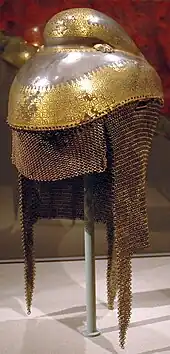






_of_the_court_of_the_Sikh_Empire.jpg.webp)

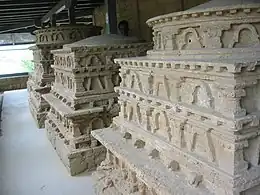



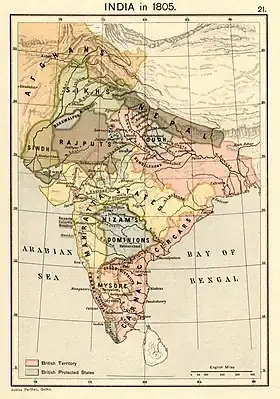




.jpg.webp)

_with_tools%252C_ca.1862%E2%80%9372.png.webp)

_Men_on_a_Pavement_and_a_Woman_in_a_Doorway_in_Delhi%252C_Shepherd_%2526_Robertson_(possibly)%252C_ca.1859%E2%80%9369.png.webp)


